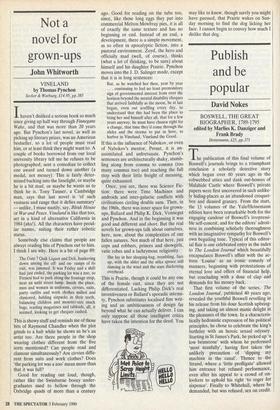Not a novel for grown-ups John Whitworth
VINELAND by Thomas Pynchon
Secker & Warburg, .£14.95, pp.385
Ihaven't disliked a serious book so much since giving up half way through Finnegans Wake, and that was more than 20 years ago. But Pynchon's last novel, as well as picking up literary prizes, was an American bestseller, so a lot of people must read him, or at least think they might want to. A couple of books borrowed from our local university library tell me he refuses to be photographed, sent a comedian to collect one award and turned down another (a medal, not money). This is fairly deter- mined backing into the limelight, or maybe he is a bit mad, or maybe he wants us to think he is. Tony Tanner, a Cambridge man, says that last novel is `of such vastness and range that it defies summary' — unlike, I muse nastily, say, Bleak House or War and Peace. Vineland is like that too, set in a kind of alternative California in 1984 (aha!). All the characters have pecul- iar names, suiting their rather robotic status.
Somebody else claims that people are always reading bits of Pynchon out to him. I think I see why. Here is a bit of page 89:
The Gate 7 Quik Liquor and Deli, hunkering down among the off- and on- ramps of its exit, was jammed. It was Friday and a shift had just ended, the parking lot was a zoo, so Frenesi had to park along the frontage strip, near an unlit street lamp. Inside the place, men and women in uniforms, civvies, suits, party outfits and work clothes milled and clamored, holding sixpacks in their teeth, balancing children and monster-size snack bags, reading magazines and tabloids, all, it seemed, looking to get cheques cashed.
This is showy stuff and reminds me of those bits of Raymond Chandler when the plot grinds to a halt while he shows us he's an artist too. Are there people in the shop wearing clothes different from the five sorts mentioned? Can people read and clamour simultaneously? Are civvies diffe- rent from suits and work clothes? Does 'the parking lot was a zoo' mean more than that it was full?
Good for reading out loud, though, rather like the Swinburne boozy under- graduates used to bellow through the Oxbridge quads of more than a century ago. Good for reading on the tube too, since, like those long eggs they put into commercial Melton Mowbray pies, it is all of exactly the same texture and has no beginning or end. Instead of an end, a development, there is a simple movement, as so often in apocalyptic fiction, into a pastoral environment. Zoyd, the hero and officially mad (well, of course), thinks (what a lot of thinking, to be sure) about himself and his daughter Prairie. Pynchon moves into the J. D. Salinger mode, except that it is in long sentences:
But, as he watched her then, year by year . . . continuing to feel no least premonitory sign of governmental interest from over the horizon beyond the mental disability cheques that arrived faithfully as the moon, he at last began, even out scuffling every day, to understand that this had been the place to bring her and himself after all, that for a few years anyway, he must have chosen right for a change, that time they'd come through the slides and the storms to put in here, to harbor in Vineland, Vineland the Good.
If this is the influence of Nabokov, or even of Nabokov's mentor, Proust, it is un- assimilated and unfortunate. Pynchon's sentences are architecturally shaky, stumb- ling along from comma to comma (too many commas too) and reaching the full stop with their little freight of meaning, quite exhausted.
Once, you see, there was Science Fic- tion: there were Time Machines and androids and inter-galactic conflicts with civilisations circling double suns. Then, in the 1960s, there was inner space for grown- ups, Ballard and Philip K. Dick, Vonnegut and Pynchon. And in the beginning it was good and different and short. But the real novels for grown-ups talk about ourselves, here, now, about the complexities of our fallen natures. Not much of that here, just cops and robbers, princes and showgirls, vatic robes and a lachrymose religiosity.
She lay in her sleeping-bag, trembling, face up, with the alder and the sitka spruce still dancing in the wind and the stars thickening overhead.
This is Prairie, though it could be any one of the female cast, since they are not differentiated. Lacking Philip Dick's real inventiveness or Ballard's sporadic intensi- ty, Pynchon substitutes localised fine writ- ing and an ambitiousness of design far beyond what he can actually deliver. I can only suppose all those intelligent critics have taken the intention for the deed. You
may like to know, though surely you might have guessed, that Prairie wakes on Sun- day morning to find the dog licking her face. I cannot begin to convey how much I dislike that dog.


















































 Previous page
Previous page